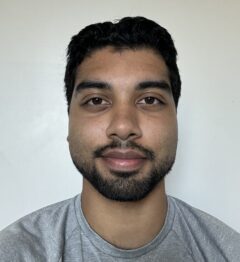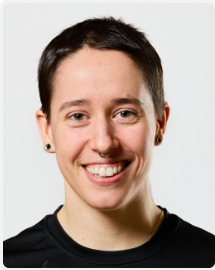Director

About me. I am an assistant professor at Carleton University (Department of Psychology) and an adjunct scientist with the University of Ottawa Institute of Mental Health Research Institute (IMHR) at the Royal Ottawa Hospital.
After completing my Ph.D. (forensic psychology, Carleton University), I completed a four year postdoctoral fellowship, two years of which was funded by a Banting postdoctoral fellowship (Canadian Institutes of Health Research). My postdoc was with IMHR (Dr. Michael Seto) and the Karolinska Institute Department of Medical Epidemiology and Biostatistics (KI) in Sweden (Dr. Niklas Långström). After completing my postdoctoral studies, I was a researcher at Public Safety Canada and Parole Board of Canada where I directed research studies in corrections and assisted in initiatives and legislations to promote evidence-base best practices for individuals with criminal histories until my move to Carleton University in 2022.
I have received the Ontario Early Researcher Award, the Association for the Treatment of Sexual Abusers (ATSA) Early Career Research Award, the John Charles Polanyi Prize (medicine), and the Royal Ottawa’s Inspiration Award (early career researcher) for my research. Our research is funded by tri-council agency grants (e.g., SSHRC IG), industry grants (e.g., Safe Online), and other funding agencies (e.g., MITACS).
Students
 |
Myles Davidson is a second year PhD student in forensic psychology. Myles’ research interests include sexual sadism, involuntary celibacy, sextortion, and risk assessment. Myles’ dissertation will examine the structure of sexual sadism as a construct and explore its relationship with paraphilic coercion via the Agonistic Continuum. Myles’ dissertation research will help establish the construct validity of the Agonistic Continuum and determine how it can best be measured in different populations, with the end goal of his research being the development and validation of a scale that accurately captures sexual sadism as a dimensional construct. Prior to beginning his PhD studies, Myles completed his MSc in Applied Psychology (Forensics) and his BA (Hons’) in Criminology and Psychology, both at Saint Mary’s University. For his honours thesis, Myles conducted a systematic review of the criminological literature on sexual assault, while his master’s thesis examined consent violations in the context of BDSM communities. Davidson CV |
|
|
Brooke Davis is a first year PhD student in forensic psychology. Brooke’s research interests include cybercriminal behaviours and assessing the risk posed by cybercriminals, including for contact offending. Brooke’s PhD dissertation will be on online sexual solicitation of minors and will focus on better understanding who perpetrates this behaviour, the varying motivating and facilitating factors that drive this behaviour, and the risk of these perpetrators engaging in other criminal or harmful behaviours. Brooke completed an MA in social psychology at the University of Toronto, during which she conducted research on social comparisons in romantic relationships. Brooke also works full-time for the Government of Canada as a Cyber Threat Analyst. |
 |
Emma Holmes is a second year Ph.D. candidate in forensic psychology. Emma’s dissertation will examine the validity of a physiological measure of the sexual interest in coercion (penile plethysmography; PPG) among men who have committed a sexual offence. Emma’s dissertation research will help inform models of the sexual interest in coercion, and in applied practices, will allow for more specific and stronger inferences about how PPG results are relevant to reoffending. Emma’s MA thesis investigated a novel model of sibling sexual abuse, which found that factors related to sexual motivation (i.e., atypical sexual interests) were more consistently related to one’s propensity to engage in sibling sexual contact than factors like antisociality or factors related to the proximity between siblings during their upbringing. Holmes CV |
|
|
Emma Holmes accepting their Association for the Treatment & Prevention of Sexual Abuse (ATSA) Pre-doctoral Research Grant (2023) valued at 10,433.09$. Research title: Measuring coercive sexual interests: The validity of thematically informed penile plethysmography (PPG) indices. |
|
|
Faye Arellano is a first-year MA candidate in forensic psychology at Carleton University. Her research interests center on the assessment and prevention of child sexual exploitation material (CSEM) offending, with a focus on implicit measures of sexual interest, offender profiling, and forensic risk assessment. She is particularly interested in identifying patterns that may support early intervention and contribute to the prevention of sexually harmful behaviour. Faye is also a research analyst with the National Cold Case Initiative (NCCI), where they assist in developing databases related to missing persons and serial homicides. |
|
|
Joelle Pagacz (co-supervisor: Dr. Michael Seto) is a first-year MA student in forensic psychology . Her thesis will focus on online solicitation/luring offenders and will analyze which factors may predict recidivism among these individuals. Additionally, she will compare luring offenders with and without child sexual exploitation material (CSEM) offences. Throughout her BSc in Psychology at the University of Ottawa, Joelle’s research experience involved non-forensic samples of individuals with a sexual interest in children. Specifically, her thesis considered how minority identity in this population is influenced by differing aspects of people’s sexual attraction (i.e., preferentiality, same gender/sex attraction, and age of awareness). |
|
|
Annika MacDonald is a first year MA candidate in forensic psychology at Carleton University. Her research interests include child sexual exploitation material (CSEM) use and prevention, risk assessment, and recidivism risks for online and contact sexual offenses. Annika completed her BSc (Hons) in neuroscience at Dalhousie University. Her undergraduate thesis examined functional connectivity in response to smoking cues in individuals with psychosis. |
|
|
Abiraam Samithamby is a second-year MA student in forensic psychology at Carleton University. His research interests focus on understanding individual and family explanations for father-daughter incest and identifying methods to prevent the use of child sexual exploitation material (CSEM) online. For his undergraduate honours thesis at Concordia University, Abiraam conducted an experimental study examining the physiological responses of actors performing narratives of sexual abuse, which inspired his dedication to preventing crimes of sexual violence, particularly against children. Samithamby CV |
Undergraduate Students
 |
Flora Haslem (co-supervised by Dr. Michael Seto) will be examining how factors such as childhood adversity, parental relationships, and mental health factors contribute to statutory offending for her honour’s thesis. |
 |
Kalyna Kuzyk is an undergraduate student concentrating in forensic psychology. Kalyna’s undergraduate thesis will examine the correlates of sending nudes in undergraduate students. Kalyna’s prior research experience includes working as a research assistant at the Universidad de Antioquia in Colombia, where she examined the phenomenology of mental illness from a classical philosophy perspective. Kalyna also works for the Canada Border Services Agency. |
 |
Maritza Laurienzo is a fourth-year undergraduate honours student specializing in developmental psychology at Carleton University. For her undergraduate honours thesis, she is examining the factors associated with sexting behavior among undergraduate students. Her research interests include fetishism, the impact of adverse childhood experiences and trauma on the development of paraphilic arousal and behaviors, as well as the exploration of paraphilic interests and behaviors in women and sexual and gender minorities. Maritza actively works with high-risk youth, which has shaped her research interests and passions, particularly regarding the sexual development of young people. She plans to pursue a MA in forensic psychology to further explore these research topics. |
 |
Joel Morrison (co-supervised by Dr. R. Karl Hanson) will examines the field validity of the Static-99R in a sample of males with histories of sexual offending in British Columbia, Canada. The primary focus is on both discrimination analyses (how well the tool rank orders individuals in terms of risk to reoffend) and calibration analyses (how well the scale established recidivism norms match reality). |
 |
Matthew Singh (co-supervised with Dr. Heather Clarke) is examining the influence of correctional interventions on parole decision making using data from the Parole Board of Canada. |
 |
Emma Sonnen (co-supervised by Dr. Michael Seto) is writing an undergraduate honours thesis exploring the victimization of statutory offending among individuals aged 13-15. |
 |
Audrey Villeneuve is examining the predictive validity of the STABLE-2007 in a large cohort of men with sexual offence histories from British Columbia, Canada. |
Past Graduate Students
|
|
Melissa O’Donaghy completed her MA in Fall 2025. For her thesis, she examined the risk profiles and correlates of child sexual offending among individuals searching for child sexual exploitation material (CSEM) on a large adult pornographic website. Other research interests include the measurement of pedophilic interests, risk assessment, and perpetration prevention programs. Melissa is now a research assistant at Public Safety Canada in the Corrections Research Unit. |
 |
Serra Baskurt is completed her MA in forensic psychology in Summer 2024. Serra’s thesis examined the recidivism rates among individuals who commit child sexual exploitation material (CSEM) offending through meta-analysis. Serra’s other research interests also include assessment and prediction of sexual violence, mentally disordered offenders, and cognitive distortions. Previously, Serra completed her BA (Hons) degree in Forensic Psychology at Ontario Tech University, where she researched the impact of empathy primary on rape supportive attitudes for those with psychopathic traits. She is now working in the Canadian Border Service Agency. |
 |
Gabriella Hilkes completed her MA in forensic psychology. For her thesis, she conducted a thematic analysis of the family environments and life circumstances of adolescents who commit sexual offences against their sisters compared to adolescents with sisters but who offend against unrelated females. Gabriella has also gained research experience as a research assistant on the Forensic Research Unit at the Royal Ottawa Mental Health Centre. Gabriella is now completing her degree in Counselling Psychology at the University of Ottawa. |
 |
Emma Holmes completed her MA in forensic psychology in Summer 2024. Emma’s thesis involves the examining risk and protective factors for sexual abuse between siblings using a community sample of siblings. Other research interests includes the measurement of sexual coercion. |
 |
Kimberly Mularczyk completed her Ph.D. specializing in forensic psychology and quantitative methodology at Carleton University in January 2023. Her dissertation centered on the roles of demographic, institutional, parole, and risk-relevant factors on the community reintegration outcomes of individuals serving federal sentences. Kimberly gained three and a half years of federal government experience working as a Research Assistant at the Parole Board of Canada in the Performance Measurement and Research Section, as well as at Public Safety Canada in the Corrections Research Unit. Kimberly is now working in provincial government as a Senior Research Analyst at BC Corrections in Victoria, BC. |






